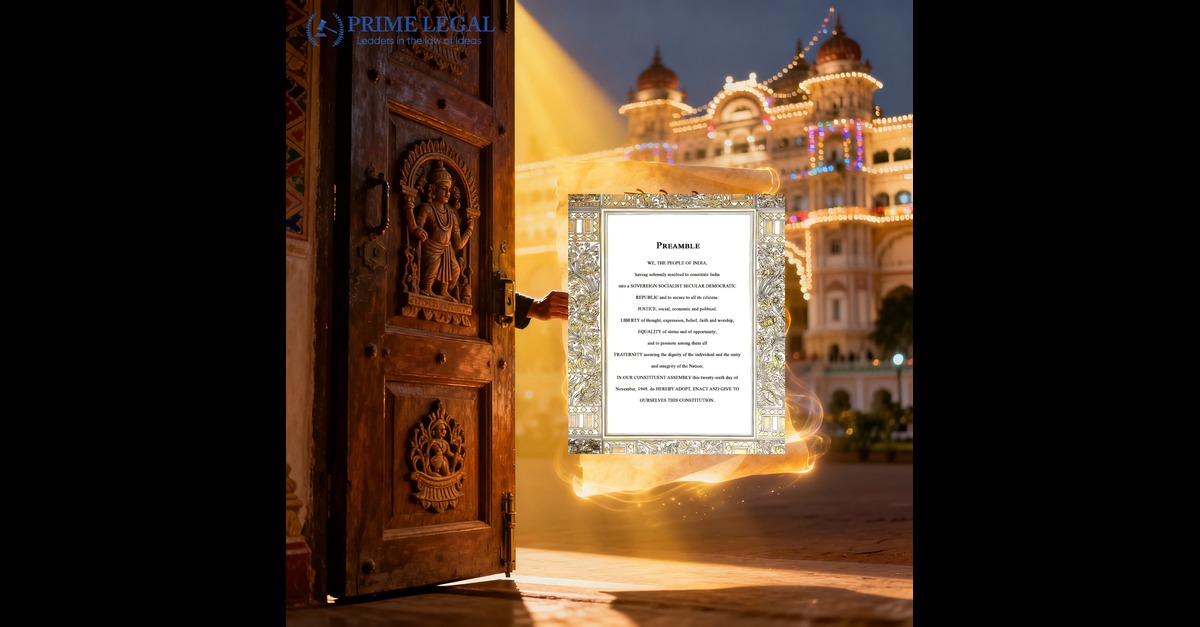Introduction
The Supreme Court of India has recently quashed a petition seeking to challenge Karnataka’s invitation to Booker Prize-winning author Banu Mushtaq to inaugurate the prestigious Dasara Mahotsav in Mysuru, which was being held within the precincts of the Chamundeshwari temple. The Court reaffirmed that the state would remain religiously neutral, as provided for by the constitutional principle of secularism in the Preamble, and that the state would not afford discrimination to citizens, based on religion, at a state-sponsored function. The allegations of infringement of religious rights were dismissed. The note examines the constitutional reasoning behind the Supreme Court’s reliance on the Preamble, as defence of government action.
Background
The controversy began when petitioner H.S. Gaurav challenged the Karnataka High Court’s decision permitting Banu Mushtaq, a Muslim author and International Booker Prize winner, to inaugurate the Mysuru Dasara festival ceremony at the Chamundeshwari temple in Mysuru. The petitioner raised the argument that allowing a non-Hindu individual to perform any rituals in a Hindu temple compromises the fundamental rights under Article 25 of the Constitution, which grants individuals the freedom of religion, and violates the religious faith and sentiments of the Hindus. The petitioner believed that the nature of the activities performed at the temple premises for the inauguration were more of a religious nature than a secular nature.
The Karnataka High Court dismissed several petitions, concluding that Dasara festival was a secular event planned and organized by the State, and that including a person from a different religion would not run afoul of constitutional provisions or religious freedoms. As such, the Court reaffirmed the value of secularism in public events.
Key Points
- The Preamble as Source of Constitutional Authority: The Supreme Court asked the petitioner “What is the Preamble of the Constitution?” as it is the document from which the commitment to secularism and equality emanates in the Constitution. The Preamble states that India is a secular state which means that the government must be neutral on religious matters and cannot discriminate against a citizen based on their religion, or lack thereof.
- State-Sponsored Event and Secularism: The Court clearly distinguished between the religious puja rituals that happened inside of the temple vs. the larger ceremony of the Dasara Mahotsav put on and organized by the state. The inauguration ceremony of the festival itself was ruled to be a secular ceremony orchestrated as a function of the state governed by constitutional processes. The Supreme Court ruled as the ceremony is state-sponsored, the government cannot exclude individuals from participating in public ceremonies based on their religious beliefs or lack of religious beliefs.
- Constitutional Doctrine of Secularism: The judgement reiterated the idea of secularism as a basic structure of the Constitution, as observed in cases like Kesavananda Bharati & Ors. v. State of Kerala (1973) 4 SCC 225 and S.R. Bommai v. Union of India AIR 1994 SC 1918. The state must remain neutral, but still promote harmony and coexistence as conceived by the constitutional makers.
- Rejection of Religious Exclusivity Claims: The Court rejected the argument that inviting Mushtaq would infringe on their religious right as Hindus. Being a participant in a state run event does not intrude on any religious freedoms afforded under Articles 25 and 26 and does not violate an individual’s or collective’s right to religious practice.
Recent Developments
The Supreme Court bench composed of Justices Vikram Nath and Sandeep Mehta has dismissed appeals against the Karnataka High Court’s order allowing the state government to invite Banu Mushtaq to the inauguration of the Mysuru Dasara festival. It reiterated that the Constitutional Preamble mandates the state be secular, emphasized that “the event is not a private religious observance, but a festival hosted and sponsored by the state” and “the government cannot discriminate between its citizens on the basis of religion”. The dismissals are a reiteration of the state’s requirements to be inclusive, equitable and neutral with people of all faiths and religions.
Conclusion
In conclusion, the Supreme Court’s defense of Banu Mushtaq’s permission to commence Mysuru Dasara provides strong support for the constitutional doctrine of secularism reflected in the Preamble. The Court requires the state to abide by values of neutrality and equality under the law when there is no adverse distinction due to a person’s religious beliefs. Distinguishing a state-sponsored ceremony from solely religious rites reinforces pluralism and inclusivity in celebration of one’s culture. Further, this position is aligned with the constitutional values for India, maintains the political order and governance, as well as the secular notions that are essential in most traditional Indian states.
“PRIME LEGAL is a full-service law firm that has won a National Award and has more than 20 years of experience in an array of sectors and practice areas. Prime legal falls into the category of best law firm, best lawyer, best family lawyer, best divorce lawyer, best divorce law firm, best criminal lawyer, best criminal law firm, best consumer lawyer, best civil lawyer.”
WRITTEN BY Stuti Vineet


